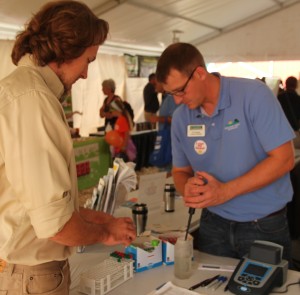With all the recent buzz about ag water quality, the Minnesota Agricultural Water Resource Center (MAWRC) offered free and confidential sample testing for nitrates at this year’s FarmFest, Aug. 5-7 near Redwood Falls.
“We tested samples of water that landowners brought from wells, drainage tile and ditches on their property,” said Tim Radatz, research specialist at MAWRC. “We got an excellent response to the service. People who were unaware that we were offering it stopped and talked to us anyway. They were interested to hear that we plan to offer nitrate testing at upcoming events, including next year’s FarmFest.”
Radatz said the samples people brought were primarily well water samples, though some samples of ditches and tiles were tested too.
It is important for farmers to keep nitrates — an essential plant food delivered to farm fields in the form or fertilizers or manure — on their fields and out of water supplies. Through organizations like the Minnesota Corn Growers Association (MCGA), farmers are investing their own money to develop strategies and practices to improve nutrient management and protect water quality.
“All of the samples were within the EPA health guidelines (10 milliliters per liter — 10 parts per million) or less and most of the well samples were one milliliter or less,” said Radatz. “These samples are a snapshot. Well water tends not to fluctuate, so it doesn’t need to be tested as often, but ongoing testing is a good idea, and especially when it comes to tiles and ditches, a series of tests over time gives a more complete picture of what is going on. Weather, crops and cropping systems, farm practices — all these can cause nitrate levels to change.”
Farmer groups like MCGA were helping to spread the word about the testing service available at FarmFest.
“After we ran the sample through the tester, we took that opportunity to talk to people,” said Radatz. “We were sharing information about what things impact nitrate levels and ways to reduce nitrate loss into water.”
MAWRC is an organization representing a coalition of farmer and commodity organizations who want to work together to achieve effective water quality policy that achieves the outcomes of protecting the environment without creating an undue or inefficient regulatory burden.


